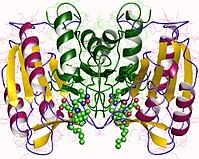
Photo from wikipedia
Acute respiratory distress syndrome (ARDS) is a uniform progression of overwhelming inflammation in lung tissue with extensive infiltration of inflammatory cells. Neutrophil apoptosis is thought to be a significant process… Click to show full abstract
Acute respiratory distress syndrome (ARDS) is a uniform progression of overwhelming inflammation in lung tissue with extensive infiltration of inflammatory cells. Neutrophil apoptosis is thought to be a significant process in the control of the resolution phase of inflammation. It has been proved that 5-Aza-2′-deoxycytidine (Aza) can inhibit cancer by activating death-associated protein kinase 1 (DAPK1) to promote apoptosis. However, the effect of DAPK1 on neutrophil apoptosis is unclear, and research on the role of Aza in inflammation is lacking. Here, we investigated whether Aza can regulate DAPK1 expression to influence the fate of neutrophils in ARDS. In vitro, we stimulated neutrophil-like HL-60 (dHL-60) cells with different concentrations of Aza for different durations and used RNA interference to up- or downregulate DAPK1 expression. We observed that culturing dHL-60 cells with Aza increased apoptosis by inhibiting NF-κB activation to modulate the expression of Bcl-2 family proteins, which was closely related to the levels of DAPK1. In vivo, ARDS was evoked by intratracheal instillation of lipopolysaccharide (LPS; 3 mg/kg). One hour after LPS administration, mice were treated with Aza (1 mg/kg, i.p.). To inhibit DAPK1 expression, mice were intraperitoneally injected with a DAPK1 inhibitor. Aza treatment accelerated inflammatory resolution in LPS-induced ARDS by suppressing pulmonary edema, alleviating lung injury and decreasing the infiltration of inflammatory cells in bronchoalveolar lavage fluid (BALF). Moreover, Aza reduced the production of proinflammatory cytokines. However, administration of the DAPK1 inhibitor attenuated the protective effects of Aza. Similarly, the proapoptotic function of Aza was prevented when DAPK1 was inhibited either in vivo or in vitro. In summary, Aza promotes neutrophil apoptosis by activating DAPK1 to accelerate inflammatory resolution in LPS-induced ARDS. This study provides the first evidence that Aza prevents LPS-induced neutrophil survival by modulating DAPK1 expression.This study demonstrates a novel mechanism in neutrophil apoptosis. In vitro, 5-Aza-2′-deoxycytidine (Aza) promotes apoptosis by enhancing death-associated protein kinase 1 (DAPK1) expression and activity. In vivo, Aza treatment accelerates inflammatory resolution in lipopolysaccharide-induced acute respiratory distress syndrome by upregulating DAPK1 expression, resulting in apoptosis of neutrophils.
Journal Title: Laboratory Investigation
Year Published: 2019
Link to full text (if available)
Share on Social Media: Sign Up to like & get
recommendations!